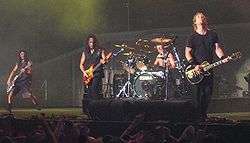Rock concert


A rock concert is a musical performance in the style of any one of many genres inspired by "rock and roll" music. While a variety of vocal and instrumental styles can constitute a rock concert, this phenomenon is typically characterized by bands playing at least one electric guitar, an electric bass guitar, and drums. Often, two guitar players share the tasks of rhythm and lead guitar playing. Rock concerts also have a social history which shapes the perception of the linguistic term and the activity itself.
During the 1950s, several American musical groups experimented with new musical forms that fused country music, blues, and swing genre to produce the earliest examples of "rock and roll." The coining of the phrase, "rock and roll," is often attributed to Alan Freed, a disk jockey and concert promoter who organized many of the first major rock concerts. Since then, the rock concert has become a staple of entertainment not only in the United States, but around the world.
The term 'rock concert' is also occasionally used to refer to live performances by distinctly non-rock acts. Live performances by pop, hip-hop, and R&B bands may not be rock concerts in the strictest sense, but they are often referred to as rock concerts regardless. These performances typically share many characteristics with rock concerts, such as an overall party atmosphere.
Bill Graham is widely credited with setting the format and standards for modern rock concerts. He introduced advance ticketing (and later computerized, online tickets), introduced modern security measures (a reaction to the deaths at the Altamont concert) and had clean toilets and safe conditions in large venues.
Rock concerts are often associated with certain kinds of behavior. Dancing, shouting, singing along with the band, and ostentatious displays by the musicians are common, though some very successful rock bands have avoided gratuitous flash in favor of understated performances focusing on the music itself. Even so, rock concerts often have a playful atmosphere both for the band and the audience.
Like rock music in general, rock concerts are emblematic of American culture's waning formality. Such concerts were crucial to the formation of youth identity in the U.S. during a time of social revolution, and have continued to represent elements of society frequently seen as "rebellious," especially against the strictures of mid-twentieth-century social normativities. One of the most well-known rock concerts was undoubtedly Woodstock, and millions of much smaller rock concerts go on every year.
Health concerns
Rock concerts are often performed at very high decibel levels. Prolonged exposure to noise at these levels can permanently damage the bones of the middle ear and the nerves of the inner ear. Thus health officials recommend that concertgoers use earplugs.[1] Since the 1960s, many musicians have worn earplugs at concerts, and some concert promoters actually give out free earplugs.